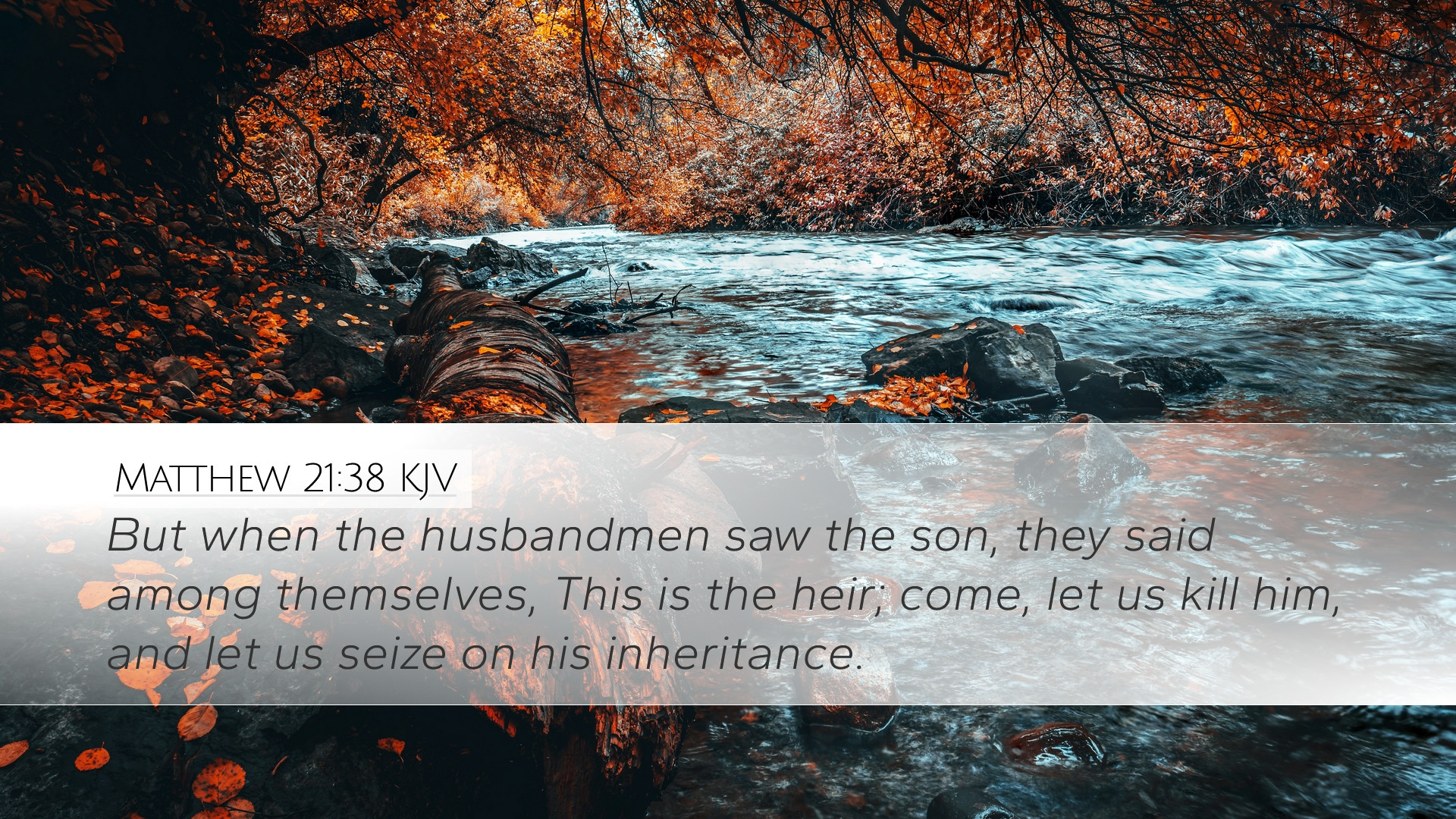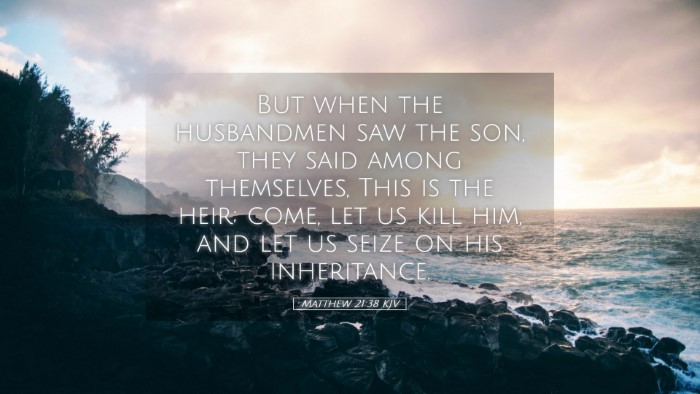Commentary on Matthew 21:38
Verse: "But when the farmers saw the son, they said among themselves, 'This is the heir. Come, let us kill him and seize his inheritance.'
Introduction
This verse is part of one of Jesus’ parables, specifically the Parable of the Wicked Tenants, which serves as a profound commentary on the rejection of divine authority and the consequences inherent in such rejection. The illustration here uses the vineyard, a frequent biblical metaphor exemplifying Israel, and establishing the connection between God's covenant people and their eschatological responsibilities.
The Context of Matthew 21:38
To fully grasp Matthew 21:38, it is essential to examine its context within the chapter and the book as a whole. This parable is directed primarily at the religious leaders of Israel who, despite being entrusted with stewardship over God’s vineyard (the nation of Israel), fail to honor and recognize God’s Son, ultimately leading to their rejection of him.
Exegesis and Analysis
This section unpacks essential aspects of Matthew 21:38 by drawing from the insights of key public domain commentators:
Matthew Henry's Commentary
Matthew Henry notes that the farmers represent the Jewish leaders who were given the charge of the people and the Law of God. He emphasizes the gravity of their rejection, highlighting that in their wickedness, they planned to kill the Son, demonstrating their disregard not only for the son but also for the owner (God) himself. Henry stresses the moral implications of their actions, pointing out that this illustrates the natural enmity of the sinful heart towards God’s truth and the lengths to which it will go to maintain control of its own vineyard (the people).
Albert Barnes' Commentary
Albert Barnes elaborates on the implications of the farmers' intent to seize the inheritance. He draws a parallel to the religious leaders’ attitudes toward Jesus, representing their closed-mindedness to divine revelation. Barnes elucidates that their ambition and greed lead them to disregard their responsibilities, creating a desperate desire to eliminate the heir in order to secure their positions. This speaks to the broader theological concept of mankind's rejection of Christ for the sake of worldly gain.
Adam Clarke's Commentary
Adam Clarke provides a thorough analysis of the parable's socio-political dimensions. He points out that the tenants’ perceptions of the son as an heir reflect the ignorance and arrogance of those in power. Clarke argues that instead of recognizing Jesus as the rightful heir and acknowledging His authority, the tenants' ambition leads them to violence. He relates this to the early Christian Church's experiences, where opposition and persecution arose from unjust authorities fearing the loss of control over their ‘vineyards’.
Theological Implications
- God’s Sovereignty: The vineyard symbolizes God's kingdom, and the owner represents God's ultimate authority over creation. The rejection of the son illustrates humanity's propensity to deny God’s rightful claim to sovereignty.
- Christological Significance: Jesus as the son is central to the understanding of God’s redemptive plan. His prompts for recognition invite the audience to see Him as both the fulfillment of prophecy and rightful King.
- The Call to Repentance: This parable serves as a prophetic warning, urging reflection on how individuals and corporate entities respond to God's message. It serves as an invitation to repent from the attitudes of the religious leaders who produce wickedness instead of fruit.
- Covenant Faithfulness and Consequences: The choices of the tenants reflect a broader narrative grappling with covenant faithfulness and accountability. Failure to produce fruit leads to divine judgment against nations and individuals.
Application for Today’s Church
As this passage beckons contemporary readers, it demands urgent introspection:
- Recognition of Christ: Just as the tenants disregarded the son, today's believers must diligently avoid complacency in their relationship with Christ, recognizing His authority in various aspects of life.
- Stewardship of God’s Gifts: Churches and leaders are reminded of their responsibility towards God’s vineyard— stewarding gifts, talents, and resources intended for His glory rather than personal gain.
- Awareness of the Worldly Influences: The tendency to seize control for selfish gain speaks to the pervasive influences of culture within the church today. A call to vigilance is necessary for maintaining integrity in ministry.
- Response to God’s Reclamation: All must be prepared for the times when God, as the vine-dresser, chooses to enact His judgment for the unfruitfulness in His vineyard.
Conclusion
The message gleaned from Matthew 21:38 transcends its immediate historical context, presenting timeless truths applicable across generations. It urges the church, leadership, and individual believers to evaluate their stewardship of the faith and their responses to divine authority. The verse serves as both a cautionary tale and a clarion call for genuine faith that produces lasting fruit in God’s kingdom.


